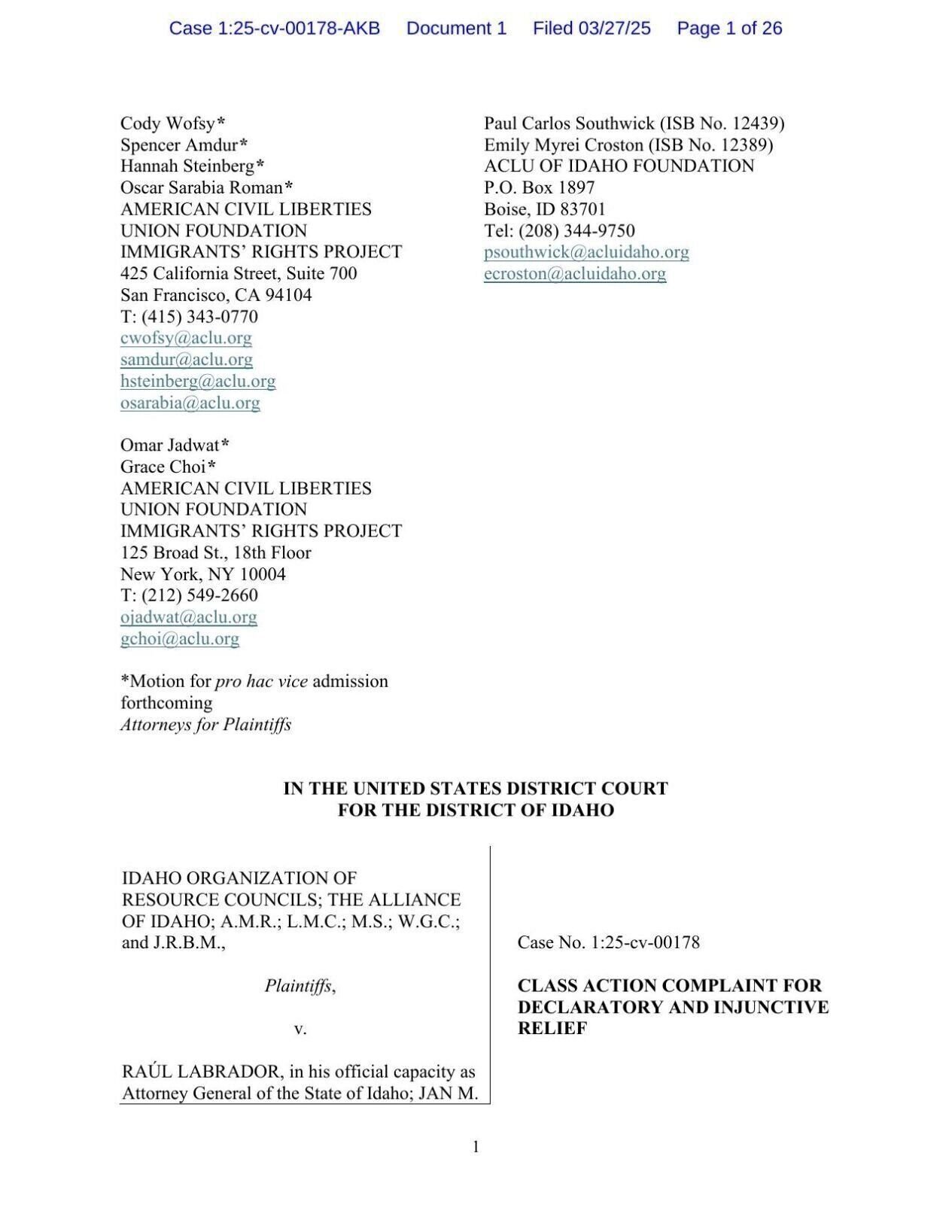BOISE — Hours after a new law creating state-level immigration crimes went into effect, the ACLU of Idaho and other groups who support immigrants filed a lawsuit challenging it.
House Bill 83 creates new crimes for “illegal entry” and “illegal reentry” into the state, and allows local law enforcement to pursue charges if someone is detained, investigated or suspected to have committed a separate crime.
“These crimes are unlike any other in the state of Idaho, and they are clearly in violation of the Constitution,” ACLU of Idaho Legal Director Paul Carlos Southwick said at a press conference.
Gov. Brad Little signed the bill Thursday; the bill is set to immediately go into effect upon passage.
“House Bill 83 is consistent with my executive order earlier this year to crack down on illegal immigration and make good on President Trump’s promise to protect our country,” Little said in an emailed statement. “I am proud to work closely with my legislative partners to support President Trump’s efforts to ensure the immigration laws on the books are enforced and to deport illegal immigrants who pose the greatest danger to our citizens.”
Bill sponsors Rep. Jaron Crane, R-Nampa, and Sen. Todd Lakey, R-Nampa, argued the bill would help Idaho address issues with immigration that the federal government has failed to fix.
Attorneys with the American Civil Liberties Union and the ACLU of Idaho, representing the Idaho Organization of Resource Councils, the Alliance of Idaho and five anonymous undocumented people who live or work in Idaho, filed a lawsuit Thursday asking a federal judge to halt HB 83's implementation.
The lawsuit argues the law is unconstitutional for three main reasons, alleging that it over-steps into what should be solely under federal authority in violation of the Supremacy Clause of the Constitution, that it violates the Commerce Clause by regulating people’s entry into Idaho and movement across and state and national borders, and that it is overly vague.
The lawsuit and ACLU representatives underscored that the bill did not require someone be convicted of a separate crime to be charged with these new state crimes, but may only be suspected of one.
“Law enforcement have new incentives to stop brown people," said Ruby Mendez-Mota, ACLU of Idaho campaign strategist.
Mendez-Mota also said anyone who appears to be Latino or who doesn't speak English could also be likely targets under the bill.
The bill authorizes local law enforcement to share information and cooperate with federal agencies on immigration, and prevents local jurisdictions from prohibiting cooperation, such as with policies of some sanctuary cities. The bill would also require law enforcement to determine if someone is a “foreign national” upon arresting anyone for a criminal offense, and if they are, the law enforcement agency would be required to notify the U.S. Department of Homeland Security.
HB 83 also creates a new crime of “trafficking a dangerous alien,” which would be knowingly and willfully transporting an undocumented person who had been convicted of a dangerous crime — defined in the bill as any felony, offense for which an extended term of imprisonment may be imposed or any offense requiring sex offender registration.
Under the bill, there would also be a sentencing enhancement, adding a mandatory minimum prison sentence of at least five years for adults convicted of a dangerous crime who had previously been deported.
The bill was based on a similar bill in Texas that has been blocked from going into effect over similar constitutional concerns as the ACLU lawsuit. After passing the House, HB 83 was amended in the Senate to avoid some of the more “challenging provisions” of Texas’ law, Lakey said previously.
Southwick argued that the amendments only added to the difficulty in following the law as written.
“They cobbled together a version of this that is incomprehensible,” Southwick said.
The lawsuit argues that, while the law makes it illegal to “enter this state at any location other than a lawful port of entry or through another manner of lawful entry,” it does not define “manner of lawful entry” between states.
“In fact, there is plainly no manner of lawfully (or unlawfully) entering one U.S. state from another,” the court filing states.“Accordingly, it is unclear from the face of the Illegal Entry provision whether a noncitizen who enters Idaho directly from another neighboring state (such as Washington) has violated this provision.”
The lawsuit also notes that the bill doesn't provide a defense for people seeking asylum or other humanitarian protection available under federal law.
The ACLU attorneys also contended that, because under the Commerce Clause of the Constitution only Congress may regulate commerce with foreign Nations and among several states, that the bill violated this provision because it "impermissibly regulates people's entry into Idaho and their movement across state and international borders."
The bill names Idaho Attorney General Raúl Labrador and county prosecutors as defendants.
“Unchecked illegal immigration has caused a myriad of problems for our nation and the State of Idaho," the attorney general's office spokesperson Dan Estes said in an email. "HB83 is part of Idaho’s efforts to cooperate with the federal government on identifying and removing criminal illegal aliens within our state borders, through coordination between local and federal law enforcement. The Office of the Attorney General is prepared to defend Idaho’s Immigration Cooperation and Enforcement Act against any constitutional challenges.”





































































